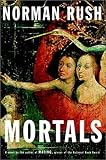 The intellectual history of modernity is in one sense the story of specialization. In the 16th Century, Descartes imagines writing a magnum opus called The World; by the 21st, it takes 500 pages just to cover Salt. Nor has the novel, that mirror dragged down the road of the culture, been immune to the proliferation of specialties and subspecialties. James Wood may posit two novelistic bloodlines, extending from Clarissa and Tristram Shandy, and Zadie Smith may see two paths going forward, but to stand before the Barnes & Noble fiction tables circa 2009 is to be asked to choose among thrillers and literary fiction, psychological novels and novels of ideas, novels driven by plot and novels driven by language, novels hailed for their imagination and those hailed for their accuracy.
The intellectual history of modernity is in one sense the story of specialization. In the 16th Century, Descartes imagines writing a magnum opus called The World; by the 21st, it takes 500 pages just to cover Salt. Nor has the novel, that mirror dragged down the road of the culture, been immune to the proliferation of specialties and subspecialties. James Wood may posit two novelistic bloodlines, extending from Clarissa and Tristram Shandy, and Zadie Smith may see two paths going forward, but to stand before the Barnes & Noble fiction tables circa 2009 is to be asked to choose among thrillers and literary fiction, psychological novels and novels of ideas, novels driven by plot and novels driven by language, novels hailed for their imagination and those hailed for their accuracy.
What the fiction writer in me loves about Mortals is that Norman Rush writes as if none of these distinctions exist. He does all of the above not just well, but wonderfully. The story of hapless CIA functionary Ray Finch’s midlife unraveling in Botswana is uproarious and deadly serious, ruminative and suspenseful, psychological and philosophical. Think Graham Greene as written by Saul Bellow. Or Thomas Mann as written by Jonathan Franzen.
Yet Mortals doesn’t feel like a mere showcase for the various novelistic virtues. Rush is downright radical in his refusal to pass judgment on his characters or to let the reader settle into a comfortable ironic distance. You have to learn, in the first 100 pages, to read through Ray’s blustery self-presentation; as with people in real life, you have to learn to love him. And the reader in me loves that. More than any other fictional character to appear in the last 10 years, Ray Finch is alive.
Read an excerpt from Mortals.
More Best Fiction of the Millennium (So Far)
Best of the Millennium, Pros Versus Readers








